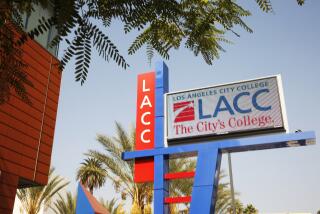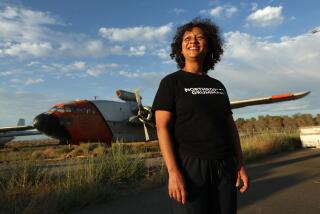GRADUATION ’90 : Classical Studies : A Canadian physicist finds understanding of the ages as a student at Thomas Aquinas College.
- Share via
Four years ago, Edward De Vita was living in Vancouver, B.C., earning more than $30,000 a year as an engineering physicist. Age 32 and single, he lived in an apartment, drove a Mazda and had good friends. Not a bad deal for most people. But one day, he noticed some books on a friend’s bookshelf, and it changed his life.
Last Sunday, De Vita received his bachelor of arts degree in liberal arts from Thomas Aquinas College in Santa Paula. He has spent the last four years and $55,000 of his savings living in a dorm with a curfew, a dress code and men 10 years his junior, enrolled in a unique curriculum based solely upon selected classics of Western civilization dating from 2500 B.C. to the early part of this century.
“I came here to study the ‘Great Books,’ the theology and philosophy,” said De Vita, his accent betraying his Canadian origin.
“This was the kind of education people used to get,” he said. The opportunity of a lifetime--to be generally, liberally educated.
De Vita already had a B.A. in applied engineering physics. Before deciding that once was not enough, he had worked for nine years at a company called TRIUMF, where he designed giant magnets for the cyclotron used in hospital treatment that creates radioactive isotopes.
“In high school, I wasn’t as interested in literature, but I became more desirous of broadening my education as I got older,” said De Vita. “What we read in philosophy could be applied in math, science lab and even literature classes.”
Thomas Aquinas College only offers one degree, a B.A. in liberal arts. It is one of a handful of colleges nationwide that offers a four-year curriculum using the “Great Books” as its formidable reading list.
Regardless of previous education, students must enroll as freshmen. There are no elective courses, and the responsibility for learning is on the students, who participate in tutorials and small seminars after reading works by such writers as Machiavelli, Descartes, Einstein and Aristotle. A professor presides at these sessions, but learning is based upon the Socratic method of question and answer, not lecture.
According to Dean Thomas E. Dillon, students read the “Great Books” in order to understand for themselves the principles and methods of various disciplines, rather than being told by experts what they mean.
“In the mathematics tutorials, we read Euclid and Apollonius on conic sections so that we are well prepared to read the texts of Galileo and Newton themselves,” Dillon said. “Then we read Descartes’ application of algebra to geometry.”
Students also study Latin for the first two years and read some classics in the original language.
Each student is assigned a writing tutor his first year and must produce a senior thesis. De Vita’s 58-page work, “On the Nature of Time,” compared the Aristotelian and relativistic views of time.
Established in 1971, Thomas Aquinas College is a private, coeducational independent Catholic school not affiliated with any religious order or diocese. Although about 90% of the students are Catholic, participation in religious activities is not required.
Enrollment is 176, there are 18 faculty members, and classes have 14 to 18 students.
Despite the rigorous curriculum, about 70% of the students complete the four-year program compared to 20% in traditional colleges. While Dillon observed that “students don’t come here to get a job after four years,” he added that a higher percentage of their alumni go on to graduate and professional schools than from traditional college programs.
Nestled on 163 rolling acres adjoining Los Padres National Forest, the college has few distractions aside from the sounds of nature. Thomas Aquinas is a residential campus with a goal of fostering a 24-hour educational process. With rare exceptions, such as married students, everyone lives in the dorms all four years. To show respect for their pursuits, students do not wear jeans or sneakers outside of sporting events. Women wear dresses or skirts, and men avoid collarless T-shirts. In class, students are addressed as Mr. or Miss. Possession of alcohol or drugs is strictly forbidden, along with any dorm visitation by members of the opposite gender.
Students are encouraged to help each other with their education.
“Ed’s mature, got a wealth of wisdom and is very affable and quick-witted. People come to him for almost everything,” said David Houseal, De Vita’s 26-year-old roommate.
“When papers are due, I’ll come in at night and find three or four guys on the bed asking questions,” said Houseal. “Because he’s had more life experience and is a bright man, Ed can make sense out of a lot of things.”
Besides study groups, men and women students socialize at school dances, intramural coeducational sports and recreational activities such as horseback riding and hiking.
Despite the age difference, De Vita has made friends and become involved in many aspects of campus life.
“Do I dance? Not very well, but I give it the old college try,” he said. “But the lambada is out.”
De Vita plays classical guitar and enjoys hockey, tennis and chess. He was the college’s volunteer choir director and helped select videos for campus screenings.
“Ed has a good sense of humor and a dry wit. He’s good at impersonations and voices.” said Carl Schmitt, 22.
“He does a great Bogart,” said John Goyette, 20. “Ed loves old, classic films.”
Both classmates were very impressed that De Vita returned to school because he felt he had missed out on a liberal arts education.
De Vita is not the only older student at the college. About 10 students ages 26 to 31 are currently enrolled, and this fall, two 26-year-old freshmen with business degrees will join them.
De Vita said that coming from a more mature perspective required an adjustment. “For the first month, I thought I had made a mistake. For instance, in the classroom, the younger students were more rambunctious.”
But he is glad he stayed. The product of a strong Italian Catholic background, De Vita now is considering entering the priesthood after returning home this summer. He would eventually like to teach in a program similar to that of his new alma mater.
One thing’s for sure. Those books made an impression on De Vita.
“I want to reread Homer’s ‘Iliad.’ ”






